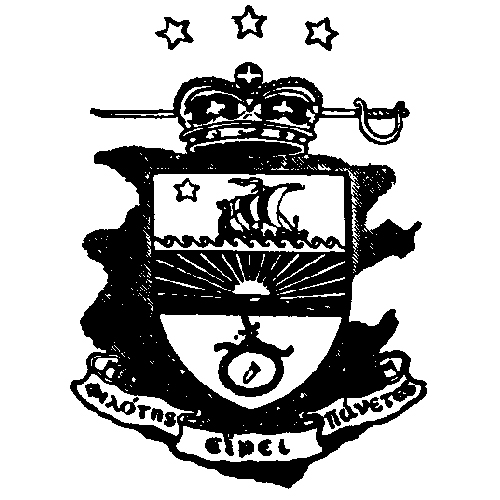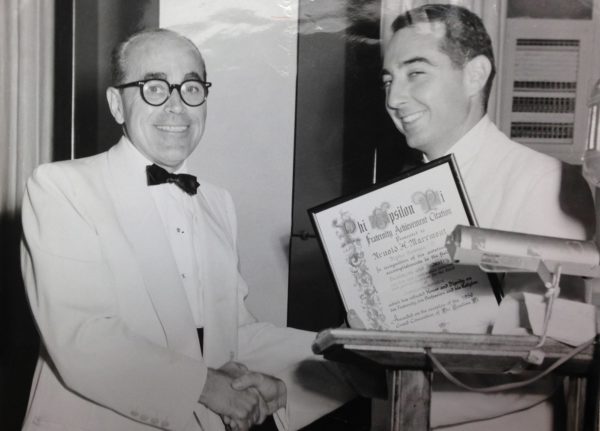Phi Epsilon Pi
 Phi Epsilon Pi Fraternity was founded at the College of the City of New York on November 23, 1904, by a small group of seven men:
Phi Epsilon Pi Fraternity was founded at the College of the City of New York on November 23, 1904, by a small group of seven men:
- Alvin P. Block
- William A. Hannig
- Arthur Hamburger
- Max Shlivek
- Abraham E. Horn
- Siegfried F. Hartman
- Arthur Hirschberg
From the very founding of the Fraternity, Phi Epsilon Pi was a non-sectarian fraternity in principle.
Some members of the Mother Chapter transferred to Columbia University and were responsible for the founding of Beta Chapter a little over a year after the original organization of Phi Epsilon Pi. Other transfers to Cornell University were responsible for the founding of Epsilon Chapter in 1911, giving the Fraternity its first out-of-town Chapter.
The three Chapters, City College, Columbia and Cornell operated more or less independently until on December 29, 1911, a small group of alumni in and around New York City decided that Systematic control and growth were essential to the establishment of a real National Fraternity. With this in mind, they established what was known as the national Executive Committee. This group adopted a constitution, assumed complete jurisdiction over the Chapters, standardized the local constitutions and conducted general business of the Fraternity. The group met monthly in New York from 1912 until 1917 but due to the necessity of having the Chapter Superior represented in most cases by proxy, the best results were not obtained. This was particularly true after the phenomenal growth of the Fraternity in 1914-1916.
At the beginning of 1917, the management of the fraternity was placed in the hands of a Grand Council with the old form of supervision by a National Executive Committee discontinued. Most of the officers lived in and around New York City so it was easy for them to meet and conduct business.
In 1918, a regional form of government was instituted and the Fraternity was divided geographically into provinces governed by a staff of officers and a Province Master. During the First World War period, the Fraternity like all other National Fraternities was faced with a real emergency but the sacrificial spirit of the officers at that time made it possible for the organization to continue.
With the addition of many new chapters, particularly in the Midwest, the Province System of governing was discontinued at the Chicago Convention in 1922. For many years there had been discussion about employment of either a full- or part-time Secretary who could manage the business affairs of the Fraternity. This was finally accomplished in Atlantic City when the Constitution was amended to provide for an Executive Secretary as a full-time officer.
Many changes were made over the years to restructure the Grand Council to assist with Chapter visitations. While there had been assistant Executive Secretaries upon occasions through the years, it was not until 1950 that the Fraternity decided to employ its first official Traveling (Field) Secretary. The Traveling Secretary was to remain in the field for the greater part of the year, visiting Active Chapters and Alumni Associations, working with new chapter prospects and serving as an assistant to the Executive Secretary.
The fraternity’s significant accomplishments continued for many years and numerous publications highlighted the activity. The Fraternity’s magazine, The Phi Epsilon Pi Quarterly, was established in December of 1915. The first Fraternity holiday was instituted in 1918 – Phi Epsilon Pi Day.” The first Directory was issued in 1920. The first Pledge Manual was published in 1934 with a song book publication following three years later. A Rush Manual was published in 1937 and revised in 1951. Manuals for administration and pledge masters were published in 1951 and a National Rushing
Brochure in 1960.
Phi Epsilon Pi was the first men’s Greek -letter fraternity to appropriate funds for activities outside of its own organization. At each Grand Convention since 1935, the Phi Epsilon Pi International Service Award was presented. Recipients of this award included individuals of diverse backgrounds. Among those  recognized for their contributions to the essentials of Brotherhood as well as for unselfish humanitarian service were: Henrietta Szold, founder of Hadassah; Justice Felix Frankfurter of the United States Supreme Court; Dr. Albert Einstein, World Renowned Physicist; Senator Herbert Lehman; Henry Monsky, former National President of B’nai B’rith; Eddie Cantor, of stage screen and radio; Louis Finkelstein, Chancellor of the Jewish Theological Seminary of America, Dr. Jonas Salk, World Renowned Scientist, Philip Klutznik, World President of B’nai B’rith; Leonard Bernstein, World Renowned Composer and Conductor and the Honorable Hubert Humphrey.
recognized for their contributions to the essentials of Brotherhood as well as for unselfish humanitarian service were: Henrietta Szold, founder of Hadassah; Justice Felix Frankfurter of the United States Supreme Court; Dr. Albert Einstein, World Renowned Physicist; Senator Herbert Lehman; Henry Monsky, former National President of B’nai B’rith; Eddie Cantor, of stage screen and radio; Louis Finkelstein, Chancellor of the Jewish Theological Seminary of America, Dr. Jonas Salk, World Renowned Scientist, Philip Klutznik, World President of B’nai B’rith; Leonard Bernstein, World Renowned Composer and Conductor and the Honorable Hubert Humphrey.
Phi Epsilon Pi can well be proud of its contribution to the war effort of our country during World War II. At least 2000 of its loyal members served in the Armed Forces. While almost all Chapters were forced to close during the WWII years, all were subsequently reactivated and encouraged by “G.I.” students, a number of new Chapters were added to the roster.
The first Canadian Chapter was organized at McGill University in Montreal, Quebec in 1951. At the Grand Convention in Atlantic City in 1961, the merger of Phi Epsilon Pi and Kappa Nu was announced formally.
| Chapter | University |
|---|---|
| Alpha | City College of New York |
| Alpha Alpha | Dartmouth College |
| Alpha Beta | University of Iowa |
| Alpha Chi | University of Nebraska-Omaha |
| Alpha Delta | University of Minnesota |
| Alpha Epsilon | Johns Hopkins University |
| Alpha Eta | University of Wisconsin-Madison |
| Alpha Gamma | University of Michigan |
| Alpha Iota | University of Miami |
| Alpha Kappa | Case Western Reserve University |
| Alpha Mu | The George Washington University |
| Alpha Nu | Muhlenberg College |
| Alpha Omicron | The Ohio State University |
| Alpha Phi | North Carolina State University |
| Alpha Pi | Louisiana State University |
| Alpha Psi | McGill University |
| Alpha Rho | Ohio University |
| Alpha Sigma | University of Mississippi |
| Alpha Tau | Queens College |
| Alpha Theta | University of South Carolina |
| Alpha Upsilon | University of Memphis |
| Alpha Xi | Boston University |
| Alpha Zeta | Harvard University |
| Beta | Columbia University |
| Beta Alpha | University of Houston |
| Beta Beta | American University |
| Beta Chi | Hofstra University |
| Beta Delta | Rensselaer Polytechnic Institute |
| Beta Epsilon | University of Florida |
| Beta Eta | Indiana University |
| Beta Gamma | Brooklyn College |
| Beta Iota | Long Island University |
| Beta Kappa | California State University-Long Beach |
| Beta Lambda | Northern Illinois University |
| Beta Mu | Long Island University-C.W. Post |
| Beta Nu | Bryant University |
| Beta Omicron | DePaul University |
| Beta Phi | West Chester University |
| Beta Pi | Western New England College |
| Beta Psi | Drake University |
| Beta Sigma | Southampton College |
| Beta Tau | Widener University |
| Beta Theta | University of Maryland - College Park |
| Beta Xi | Baruch College |
| Beta Zeta | Philadelphia College of Textiles & Science |
| Chi | Syracuse University |
| Delta | Washington and Lee University |
| Epsilon | Cornell University |
| Eta | University of Pennsylvania |
| Gamma | Northwestern University |
| Iota | Dickinson College |
| Kappa | New York University |
| Kappa Alpha Delta | University of California-Los Angeles |
| Lambda | Rutgers State University of New Jersey |
| Mu | University of Georgia |
| Nu | University of Virginia |
| Omega | University of Cincinnati |
| Omicron | Tufts University |
| Phi | Carnegie Mellon University |
| Pi | University of Maine-Orono |
| Psi | University of Illinois at Urbana-Champaign |
| Sigma | Brown University |
| Tau | Auburn University |
| Theta | Pennsylvania State University |
| Upsilon | University of Connecticut |
| Xi | Georgia Institute of Technology |
| Zeta | University of Pittsburgh |
